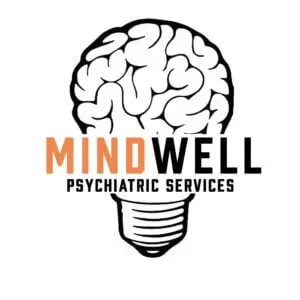Can Las Vegas Psychiatrists Prescribe Medication?
Yes, A Psychiatrist can prescribe medication. At Mindwell Psychiatric Services, under the care of Michael Kuron, MSN, APRN, PMHNP, we often get asked this. Many people with mental health issues like anxiety or bipolar disorder need clear answers about their treatment options. At MindWell Psychiatric Services in Las Vegas, we evaluate whether medication might be part of your treatment plan and explain how the process works.
First, it’s key to know that psychiatrists have medical training to check mental health carefully. They can prescribe medicines that may be crucial for managing mental illnesses. For example, someone with severe anxiety might benefit from certain medications that help control their symptoms better. Knowing that a psychiatrist in Las Vegas can offer this kind of help is comforting for those looking for support.
Also, psychiatric medicines are made to fit each person’s needs. Mindwell takes the time to understand each patient’s unique situation. Then, they talk about the best treatments, which might include medicine to help improve mental well-being. The main goal is to help people feel better and improve their quality of life when they face tough mental health challenges.
Understanding Psychiatrist Qualifications
Essential Medical Education
Firstly, it’s essential to understand that psychiatrists start their journey with extensive medical education. This education covers all areas of health, but they focus particularly on mental health. In other words, they receive specialized training to understand the brain and its complexities.
Specialized Psychiatric Training
In addition, after completing medical school, psychiatrists enter a residency program specifically in psychiatry. This is also where they truly start to hone their skills. During residency, they learn various treatment methods, including the use of antidepressant medication, mood stabilizers, and reuptake inhibitors. So, these medications are crucial for treating a range of mental health conditions effectively.
What is Psychiatry?
Psychiatry is a branch of medicine that focuses on mental health. Psychiatrists help people with mental disorders. They can diagnose and treat these conditions. They use different methods, like therapy. But can psychiatrists prescribe medication? Yes, they can. This is an important part of their job.
Psychiatrists go through a lot of training. They go to medical school first. After that, they train in psychiatry. This helps them understand the human mind. In other words, they learn how to treat mental health issues well. Also, they know which medications can help. So, can psychiatrists prescribe medication? Yes, they can. They use their knowledge to help people feel better.
Licensing and Prescription Authority for Psychiatrists
Getting a License to Practice
To become a psychiatrist, doctors must pass many hard tests and meet strict rules. This also ensures they really understand mental health and know how to use medications safely to treat diagnosable mental issues. Unlike psychologists, who can’t prescribe medications, psychiatrists in Las Vegas learn a lot about clinical psychopharmacology, which lets them give patients the right medicine.
Understanding Prescription Authority
Once they get their license, psychiatrists like Michael Kuron,MSN, APRN, PMHNP can give out medicine. This is important for treating mental disorders like severe sadness or mood swings. They also need to really understand the medicines they use and how much to give to each patient.
Using Tests to Guide Treatment
Above all, psychiatrists use mental health tests to see what their patients need. These tests check if the medication is helping or if it needs to be changed. So this way, he makes sure the treatment is safe and works well for his patients.
Why Psychiatrists Can Prescribe Medication?
Psychiatrists can prescribe medication because they are licensed doctors who specialize in mental health. This means they can give medicines that help with mind and mood problems like sadness, worry, or other conditions. Their training helps them know how these medicines work to make you feel better.
Deepening Knowledge and Experience
Continuous Learning and Certification
Also, psychiatrists are required to keep their knowledge current. They do this by participating in ongoing education and recertification processes throughout their career. Then, this commitment ensures they stay updated with the latest advancements in psychiatric medication and treatment approaches.
Hands-On Clinical Experience
Psychiatrists gain crucial experience during their training by working directly with patients. They use this time to learn how different medications actually help people. This hands-on practice is important because it allows them to adjust treatments to best fit each person’s needs, even though only psychiatrists, not psychologists, can prescribe these medications.
Applying Expertise in Patient Care: Can psychiatrists prescribe medication?
Tailoring Medication to Patient Needs
Finally, the ability to prescribe medication is a significant part of a psychiatrist’s role. They use their deep understanding of psychiatric medications, including newer reuptake inhibitors, to tailor treatments specifically to each patient’s needs. For instance, deciding when a patient might benefit from a specific type of antidepressant or when a different approach might be more effective.
Ethical Considerations and Patient Safety
Furthermore, psychiatrists are bound by ethical considerations to ensure patient safety and the most effective treatment outcomes. They must consider the best interests of their patients when prescribing medications, ensuring each treatment plan is thoughtfully crafted and monitored.
Comprehensive Approach to Medication in Psychiatry: Can psychiatrists prescribe medication?
It’s good to know how two types of mental health workers differ. Psychologists talk with people to help them handle their feelings, but they can’t give out medicine. Psychiatrists, like Michael Kuron,MSN, APRN, PMHNP have training to give medicine, such as antidepressants, for tougher problems. This helps improve how we treat mental health.
What is the Difference Between a Psychiatrist and a Therapist?
A psychiatrist is a medical doctor who focuses on mental health disorders. They can prescribe medication to help treat these issues. For instance, if you have an eating disorder or a personality disorder, a psychiatrist might give you medicine to help manage your symptoms. They look at both mental and physical health, ensuring you get the best care.
On the other hand, a therapist helps you talk about your feelings and behaviors. They cannot prescribe medication. Therapists work with you through talking and other methods to help you cope with mental health disorders. Both psychiatrists and therapists are important health providers, but they have different roles. Therefore, if you need medication for your mental health, you should see a psychiatrist. They can prescribe medication to support your treatment plan.
What is the Difference Between a Psychiatrist and a Neurologist?
A psychiatrist and a neurologist both help people, but in different ways. A psychiatrist focuses on mental health. They treat conditions like depression and anxiety. Can psychiatrists prescribe medication? Yes, they can. They often use medication as part of their treatment. Psychiatrists also use behavioral therapy to help patients.
A neurologist, on the other hand, treats brain and nerve problems. They handle conditions like epilepsy and migraines. Neurologists do not focus on mental health. Instead, they look at physical issues with the brain and nerves. In other words, psychiatrists and neurologists are both important. But they work on different health problems. Mental health providers, like social workers and psychologists, often work with psychiatrists to help treat patients. But only psychiatrists prescribe medications for mental health issues.
The Role of Medication in Treating Mental Illnesses
Psychiatrists in Las Vegas use medicines because they help fix chemical imbalances in the brain, which makes people feel better. For example, mood stabilizers and antidepressants help those with bipolar disorder by making their moods more stable. This makes it easier for them to benefit from talking therapy.
Medication as Part of a Broader Treatment Strategy
At Mindwell Psychiatric Services, uses medication as just one part of a bigger plan to help patients. Therefore, he combines medicine with talking therapies and changes in daily habits to provide complete care. Also, the main aim is to help patients feel better and enjoy life more.
Monitoring and Adjustments
After that, a patient starts taking medication, it’s crucial to keep a close watch on how it’s working. This regular checking make sure the medicine is still doing its job right and change the amount if needed. If the medicine isn’t working well or causes problems, he can try other options.
Educating Patients on Their Treatment Options
Above all, education plays a crucial role in the treatment process. He spends time educating his patients about their conditions, the role of medications, and the importance of adhering to their treatment plans. So, this knowledge empowers patients, helping them to become active participants in their recovery process.
Collaboration Among Healthcare Providers
At Mindwell Psychiatric Services, working together with other health experts is key to how we care for patients. This helps make the treatment better and looks after all parts of a patient’s health. By coordinating with others, He also ensures that the care plan is complete. So, when asking Can psychiatrists prescribe medication? Yes, they can, and uses this ability along with teamwork to provide the best care.
What Does a Psychiatrist Do and What Conditions Do Psychiatrists Treat?
Role of a Psychiatrist
- Diagnose Mental Illness: Psychiatrists identify mental health problems in patients.
- Provide Therapy: They offer therapy sessions to help patients cope.
Can Psychiatrists Prescribe Medication?
- Prescribe Medication: Yes, psychiatrists can prescribe medication to treat mental health issues.
- Medication Management: They manage and adjust dosages for best results.
Licensed Medical Professionals
- Licensed Medical Doctors: Psychiatrists are trained and licensed medical doctors.
- Medical Training: They complete medical school and specialized training in psychiatry.
Types of Medications
- Psychotropic Medication: They prescribe psychotropic medication to manage mental health.
- Medications: These can include antidepressants and antipsychotics.
Conditions Treated
- Depression: Psychiatrists treat people with long-term sadness.
- Anxiety: They help patients who have constant worry and fear.
- Bipolar Disorder: They treat mood swings from very happy to very sad.
- Schizophrenia: They help those who see or hear things that are not there.
Special Populations
- Child and Adolescent: Psychiatrists also treat children and teens with mental health issues.
- Adult and Elderly: They work with adults and older people too.
Other Responsibilities
- Collaborate with Other Doctors: Psychiatrists often work with other healthcare providers.
- Create Treatment Plans: They make plans that might include therapy and medication.
Psychiatrists are vital in treating various mental health conditions. They can prescribe medication, including psychotropic medication, and provide therapy. As licensed medical professionals, they help patients of all ages, from child and adolescent to adults and the elderly.
Understanding Medications Prescribed by Psychiatrists
What Medications Do Psychiatrists Prescribe?
At Mindwell Psychiatric Services, give out medicines to help people with mental health problems. These are called prescription medications. Each person gets medicine that’s picked just for them. So, can psychiatrists prescribe medication? Yes, they can, and they choose the best one to help each person feel better.
Types of Common Medications
- Medicines for Mood: These are used to help people who feel very sad or very happy in extreme ways, which is not normal for them.
- Medicines for Thinking Clearly: Some people might see or hear things that aren’t there, or believe things that aren’t true. Certain medicines help make their thoughts clearer.
- Medicines for Worrying: These help people who feel nervous, scared, or worried all the time to feel calmer.
How Psychiatrists Decide on Medication
Learning About the Patient
Before giving any medicine, he talks a lot with the person, learning about their feelings, how long they’ve been feeling this way, and what treatments they’ve tried before. This helps him understand what kind of help they need.
Working with Other Doctors
Sometimes, he works with other healthcare professionals to make sure the treatment plan is the best it can be. This team might include other doctors who focus on talking therapies, known as psychologists, rather than medicine. This is because he can prescribe medication, but psychologists cannot.
Clear Communication and Education
Teaching Patients About Their Medications
Michael Kuron, MSN, APRN, PMHNP makes sure his patients know how their medications work, how to take them, and what effects they might have. He takes time to explain everything clearly so patients can use their medicine safely and well. This also helps everyone feel more confident and informed about their treatment.
Support Throughout Treatment
Mindwell Psychiatric Services are always there to help patients through their treatment. So, they check in often to see if the medicine is working and to make sure there are no problems.
The Benefits of Psychiatric Medication: Can psychiatrists prescribe medication?
Making Daily Life Better
At Mindwell Psychiatric Services help a lot of people feel better. Then, these medicines can help someone who is very sad or worried feel more relaxed and happy. They are very helpful for people to handle their feelings and live normal lives. So, yes, psychiatrists can prescribe medication. This is important because it helps many people improve their mental health.
Keeping Moods Stable
For people whose feelings change a lot and quickly like feeling super happy one minute and very sad the next medications can make their moods more even. This is really helpful because it makes life less of a rollercoaster. He can prescribe these medications because he is a psychiatrist. Psychiatrists know a lot about different medicines for the brain and which ones are best for different problems.
Helping Other Treatments Work Better
Sometimes, talking to a therapist or changing things in your life can help with mental health issues, but it might be hard to do these things if your symptoms are very strong. Medications can lower these symptoms, making it easier to talk about your feelings with a psychologist and work on problems together.
Understanding Mental Health Care at Mindwell Psychiatric Services
Psychiatrists vs. Psychologists
Michael Kuron, MSN, APRN, PMHNP is a psychiatrist, which means he studied a lot, including in medical school, so he can prescribe medications. This is a key difference from psychologists, who don’t go to medical school and can’t give out medicines. Psychologists talk with you to help you manage your feelings and behaviors better. Both types of professionals are important in mental health care, but they do different jobs.
Can psychiatrists prescribe medication? Yes, they can. Psychiatrists use their deep understanding from medical school to safely prescribe medicines that help with mental health issues. So, this helps people feel better under careful guidance.
Teamwork for Better Health
At Mindwell Psychiatric Services, effort is great because it mixes talking therapy with medication. Some patients find they get the most help when they use both treatments. This combination makes sure all parts of a patient’s mental health are cared for.
Keeping Wellness Going
Taking medication for a long time helps many people stay well. He watches his patients closely to make sure the medications keep working and don’t cause any issues. So, if changes are needed, he can adjust the medications. This careful watching helps patients feel better for a longer time.
Learning About Your Medication
He also teaches his patients about their medications—what they do, how they work, and what side effects they might have. Knowing all this helps patients be part of their own care. So, it makes them feel more in control and able to manage their health better.
Mental Health Treatments: Can psychiatrists prescribe medication?
Medication vs. Other Mental Health Treatments
At Mindwell Psychiatric Services, He believes that using different treatments together usually helps the most. So, let’s look at how medicines work with other ways of helping, like talking to a therapist.
Medicines can be very important for treating mental health problems. Can psychiatrists prescribe medication? Yes, they can. They uses medicine to help quickly reduce problems like severe sadness or worry. This makes it easier for people to start feeling better.
What Medication Does
Medication Prescription and Management plays a crucial role in mental health care. As a psychiatrist with a degree in medicine, he can prescribe medications designed to quickly alleviate symptoms like severe sadness, fear, or worry. So here’s why medication is helpful:
- Fast Relief: Medications can quickly lessen severe symptoms, which is vital for immediate relief.
- Steady Moods: They help maintain stable moods, reducing extreme ups and downs.
- Enhancing Therapy: Medications manage symptoms to a level where patients can engage more effectively in therapy.
Talking Therapies
So, therapy involves speaking with a trained therapist or counselor to better understand and manage your thoughts and feelings.
- Long-Term Skills: Therapy equips people with strategies to handle challenges beyond the therapy room.
- Addressing Causes: Also, it digs into the root causes of mental distress, not just the outward signs.
- No Medication Side Effects: Therapy involves no drugs, so there are no drug-related side effects to manage.
Combining Medication and Therapy
Using both methods together typically brings the best results:
- Medication: Controls the physical symptoms, making it easier to engage in psychological exploration and learning during therapy.
- Therapy: Also, offers emotional support and teaches techniques to better manage daily life.
Understanding the Roles of Mental Health Professionals
So, it’s important to recognize the distinct roles in mental health care:
- Psychiatrists: As medical doctors, they can prescribe medication. With his background in professional psychology and a master of science, is well-equipped to manage psychiatric medication.
- Psychologists: Focus on providing therapy. They do not prescribe medication but work with psychiatrists to offer comprehensive care.
Additional Support Methods
Other supportive measures can also enhance well-being:
- Lifestyle Changes: Regular exercise and a healthy diet can significantly improve mental health.
- Support Groups: Sharing experiences with others facing similar issues can provide extra support and comfort.
- Natural Methods: Techniques like yoga or meditation can relax the mind and body.
Looking at Results
Studies and experiences at Mindwell show that combining medication with therapy often yields the best outcomes. This approach not only manages symptoms effectively but also helps individuals develop their own coping strategies for future challenges.
The Impact of Medication on Daily Life: Can Psychiatrists Prescribe Medication?
Daily Routine with Medication
Taking medication as part of your daily routine is very important for patients at Mindwell Psychiatric Services, where Michael Kuron, MSN, APRN, PMHNP, helps. Can psychiatrists prescribe medication? Yes, they can prescribe mental health medications that help keep your mind steady. He shows his patients how to fit taking their medication into their daily lives as naturally as eating breakfast or brushing teeth.
Side Effects and How to Handle Them
Sometimes, medicines can make you feel different in ways you did not expect. For example, some common medications for mood might make you feel tired. He listens carefully to his patients and might change the medicine or how much to take to make sure it helps without too many problems.
Keeping Life Balanced
He also advises everyone to eat well, stay active, and get enough sleep. These good habits make the medicine work better and help you feel your best.
Family and Friends Can Help
It’s great to have people who care about you know about your treatment. He encourages open talks with family and friends. They can remind you to take your medicine and help you feel better when you’re down.
Help at Work
Michael Kuron, APRN, also helps patients talk to their bosses about their needs. This might mean taking breaks at certain times to help deal with any side effects from the medicine.
Understanding Different Roles
Psychiatrists can prescribe medications because they are medical doctors. Psychologists, on the other hand, provide talking therapies but do not prescribe drugs. He often works with psychologists to ensure that patients get both talking therapy and medication, which often helps a lot.
When Should I See a Psychiatrist?
Feeling Overwhelmed
- Persistent Stress: If you feel stressed all the time, it might be time to see a psychiatrist.
- Daily Struggles: When daily tasks feel too hard, you may need help.
- Seek Help: It’s okay to seek professional medical advice when you can’t handle things alone.
Mental Health Symptoms
- Long-Term Sadness: Feeling sad for a long time is a sign to see a psychiatrist.
- Anxiety: If you worry too much and it affects your life, get help.
- Mood Swings: Big mood changes can mean you need a psychiatrist.
Need for Medication
- Can psychiatrists prescribe medication? Yes, they can.
- Medication Needs: If you think you need medication, see a psychiatrist.
- Psychiatric Medication: They can prescribe psychiatric medication to help you feel better.
Other Treatments Not Working
- Therapy Alone: If therapy alone isn’t helping, see a psychiatrist.
- Professional Medical Advice: They can give you advice and more treatment options.
- Commonly Prescribed: Psychiatrists can offer commonly prescribed medications to help.
Difficulty in Relationships
- Relationship Problems: Big problems with family or friends can be a sign.
- Impact on Life: If these problems affect your daily life, see a psychiatrist.
- Couples Therapy: They can also suggest couples therapy if needed.
Substance Abuse
- Alcohol or Drugs: If you use substances to cope, see a psychiatrist.
- Need for Help: They can help you find better ways to manage your feelings.
Seeing a psychiatrist can help you manage mental health issues. They can prescribe medication and offer therapy to improve your well-being.
What Can I Expect During an Appointment with a Psychiatrist?
Initial Consultation
- Discussion: The psychiatrist will ask about your symptoms and concerns.
- History: They will review your medical and mental health history.
- Questions: Expect questions about your lifestyle and any past treatments.
Evaluation
- Assessment: The psychiatrist will assess your mental and physical health.
- Diagnosis: They may provide a diagnosis based on your symptoms.
- Treatment Plan: A treatment plan will be discussed, including therapy options and medications psychiatrists prescribe.
Treatment Options
- Medication: Can psychiatrists prescribe medication? Yes, they will discuss this as an option.
- Therapy: They might suggest behavioral therapy or couples therapy.
- Referrals: They may refer you to other specialists, like psychologists or social workers.
Follow-Up Visits
- Monitoring: Regular visits to monitor your progress.
- Adjustments: Medication or therapy plans may be adjusted as needed.
- Support: Ongoing support to help manage your condition.
Treatment Settings
- Office Visits: Most appointments happen in the psychiatrist’s office.
- Hospital: Some treatments may require hospital visits.
- Marital and Family: Therapy can include marital and family sessions.
Expect your psychiatrist to work closely with you. They might also work with other mental health providers. This ensures a comprehensive treatment approach. Remember, psychologists prescribe medications differently, so always check with your psychiatrist.
Conclusion
At Mindwell Psychiatric Services, many people ask whether psychiatrists can prescribe medication. Yes, they definitely can. He is trained in professional psychology and knows a lot about medicines for the mind. He chooses the best medication for each person who comes for help. This is very important because the right medication can make a big difference in someone’s life. It helps them feel steadier and less troubled by their thoughts and feelings. They make sure each medicine he prescribes fits the person’s specific needs and health situation.
Besides just giving out medication, Mindwell does a lot to support each patient. They talk with patients often to make sure they understand how their treatment works and feel okay with it. He also works with psychologists, who don’t prescribe medicine but provide valuable talking therapy. This team approach helps treat patients in the best way possible. For example, a patient might have a depression test to see how they’re doing and then get the right medicine and therapy based on the results. This shows how Mindwell cares for each patient, making sure they get the right help to feel better.
FAQs
Can psychiatrists prescribe medication?
Yes, psychiatrists at places like Mindwell Psychiatric Services can prescribe medicines for issues like anxiety and depression. These medicines really help improve how you feel.
How do psychiatrists decide which medication to prescribe?
A psychiatrist talks to you about your feelings, might do tests like a depression or anxiety test, and looks at your health history. This helps them pick the best medicine for you.
What's the difference between a psychologist and a psychiatrist?
Psychiatrists can give out medicine because they went to medical school. Psychologists do therapy but don’t prescribe drugs. Both help with mental health but in different ways.
Can I see a psychologist and a psychiatrist at the same time?
Yes, many people see both. So this way, you can get medicine from your psychiatrist and talk therapy from your psychologist, which covers everything.
Do psychiatrists only prescribe medication, or do they provide therapy too?
Some psychiatrists at places like Mindwell also do therapy. But they mainly focus on treating mental health conditions with medicine.
How often do I need to see my psychiatrist for medication checks?
It varies based on your treatment plan. You might see them more at the start, then less often once your medicine is doing well.
What should I do if I experience side effects from my medication?
Talk to your psychiatrist. They can also change the dose or try a different medicine. So, it’s important to discuss how you feel after starting any new medicine.
Can a psychiatrist help if I'm unsure whether I need medication?
Definitely. Psychiatrists look at your symptoms and can suggest different treatments, including medicine if needed. They help you know your choices so you can decide well.
What qualifications do psychiatrists have to prescribe medication?
Psychiatrists have a medical degree and extra training in mental health treatment. So, they are licensed to prescribe and manage mental health medicines.
How does treatment from a psychiatrist integrate with other healthcare providers?
Psychiatrists often team up with other health professionals for complete care. This also might mean working with psychologists, family doctors, and other specialists to look at all parts of your health.





